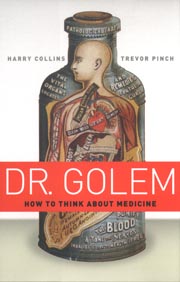Medicine is like 'lumbering fool' that doesn't know its own strength and ignorance, latest 'Golem' book asserts
By Susan Lang

A golem is a well-meaning, cloddish, clay creature in Jewish mythology that provides protection from enemies; but it is a lumbering fool that doesn't know its own strength or the extent of its own clumsiness and ignorance.
That is just like modern medicine, asserts the new book "Dr. Golem: How to Think About Medicine," co-authored by Trevor Pinch, professor and chair of the Department of Science and Technology Studies at Cornell University.
Pinch and co-author Harry Collins, a sociologist at Cardiff University, explore some of the complexities and conundrums of modern medicine, which they describe as rooted in science but highly fallible, such as: the questionable need for tonsillectomies, the powerful but not-well-understood placebo effect, bogus doctors, the debatable effectiveness of cardiopulmonary resuscitation (CPR), alternative medicine and the efficacy of using vitamin C to fight cancer, the "yuppie flu" (chronic fatigue syndrome), fibromyalgia and "other contested diseases," the influential medical expertise of AIDS activists, and parents' rights to avoid vaccinating their children.
"We've attempted to examine the tension between the conflicts inherent in medicine, such as how medicine is used as a science on the one hand but as a source of comfort on the other," says Pinch, an expert on the sociology of scientific knowledge, technology, markets and even of music and musical instruments. The authors also take into account how medicine serves the interests of an individual versus that of the group (for example, giving vaccinations to protect the community at the expense of potential side effects and risks to the individual).
"Our theme is the making of medical judgments in the face of the uncertainties and tensions found within even the most well-conducted and unbiased of sciences," the authors write in the introduction of their 276-page book.
Just as Collins and Pinch discussed the golem in technology in "The Golem at Large: What You Should Know About Technology" (1998) and in science in "The Golem: What Everyone Should Know About Science"(1993), they now explore the limitations of the science and application of medicine.
"'Dr. Golem' stalks the uncertainty of modern medicine, exploring its shaky clinical foundations, its bogus claims and even its bogus practitioners," said Roger Cooter of the Wellcome Trust Centre for the History of Medicine at University College London, in a review. "But it is neither with cheap cynicism nor appeals to popular anti-science sentiment. … Rather it is with the steely logic of the sociology of science -- albeit tempered by wit, irony and engaging personal anecdotes."
Media Contact
Get Cornell news delivered right to your inbox.
Subscribe